- News
- Reviews
- Bikes
- Components
- Bar tape & grips
- Bottom brackets
- Brake & gear cables
- Brake & STI levers
- Brake pads & spares
- Brakes
- Cassettes & freewheels
- Chains
- Chainsets & chainrings
- Derailleurs - front
- Derailleurs - rear
- Forks
- Gear levers & shifters
- Groupsets
- Handlebars & extensions
- Headsets
- Hubs
- Inner tubes
- Pedals
- Quick releases & skewers
- Saddles
- Seatposts
- Stems
- Wheels
- Tyres
- Tubeless valves
- Accessories
- Accessories - misc
- Computer mounts
- Bags
- Bar ends
- Bike bags & cases
- Bottle cages
- Bottles
- Cameras
- Car racks
- Child seats
- Computers
- Glasses
- GPS units
- Helmets
- Lights - front
- Lights - rear
- Lights - sets
- Locks
- Mirrors
- Mudguards
- Racks
- Pumps & CO2 inflators
- Puncture kits
- Reflectives
- Smart watches
- Stands and racks
- Trailers
- Clothing
- Health, fitness and nutrition
- Tools and workshop
- Miscellaneous
- Buyers Guides
- Features
- Forum
- Recommends
- Podcast
review
£239.99
VERDICT:
Top-end and top-performing winter shoes with modern technology and design triumphing over the elements
Weight:
914g
Contact:
At road.cc every product is thoroughly tested for as long as it takes to get a proper insight into how well it works. Our reviewers are experienced cyclists that we trust to be objective. While we strive to ensure that opinions expressed are backed up by facts, reviews are by their nature an informed opinion, not a definitive verdict. We don't intentionally try to break anything (except locks) but we do try to look for weak points in any design. The overall score is not just an average of the other scores: it reflects both a product's function and value – with value determined by how a product compares with items of similar spec, quality, and price.
What the road.cc scores meanGood scores are more common than bad, because fortunately good products are more common than bad.
- Exceptional
- Excellent
- Very Good
- Good
- Quite good
- Average
- Not so good
- Poor
- Bad
- Appalling
Effective at keeping the worst of the elements at bay, the Northwave Extreme RR GTX shoes/boots improve your winter cycling by keeping your feet warm and relatively dry.
- Pros: No more bulky than summer shoes, weatherproofing and insulation, easy to clean
- Cons: Slow to dry out when they do get wet inside
I think there is a definite divide among cyclists: those who stay off the road in winter and hit the indoor trainer, and those who will ride outside regardless of the conditions. I fall into the latter category – of course riding indoors has its uses when it's really bad outside, but I don't have the patience to achieve a decent indoor ride staring at a wall or a laptop.
> Find your nearest dealer here
Riding outdoors in winter, I've tried numerous combinations over the years to maintain some sort of warmth and usability in my extremities, coming to the conclusion that the only real solution is a decent pair of winter boots.
Enter the new Northwave road offering, the Extreme RR GTX, which Northwave is keen to point out are not boots. They have been designed to rid the shoe of the bulk, restrictions to power transference and foot movement that boots can induce. By using state-of-the-art materials, Northwave has managed to slim down the profile and overall thickness of the outer layers without sacrificing any of the weatherproofing or insulating properties (Northwave says down to -15 degrees), and been able to use a lightweight carbon and fibreglass sole.
Out of the box – as you would expect, to be fair – they aren't super-light but are distinctly less bulky than traditional winter boots. As you can see, they do look a lot more like a summer shoe than a boot, quite sleek with a single Boa-style dial and the wrapover upper giving a stealthy look.
The collar is a neoprene material with a special Gore-Tex Rattler membrane, the upper infused with a Gore-Tex Duratherm Kelvin membrane which is windproof and waterproof and wicks away sweat.
The sole has rubber toe and heel bumpers (the heel replaceable), with small meshed vents to help with breathability, and accepts three-bolt cleats only; there is a specific model for two-bolt mountain bike/SPD use.
Also included is a shoe-specific footbed, the Arctic GTX, with a four-layer aluminium film and fleece construction that works with the outer membrane to keep everything nice and toasty. It occurred to me it might be worth taking the footbed out and using it in my summer shoes when we get the odd nippy spell in spring and autumn; I'll certainly be giving it a try when the time comes.
Getting the shoes on is a bit of a fiddle initially, because you need to slide your foot in through the collar. This, although reasonable stretchy, has to be fairly narrow to ensure a snug fit against your ankle when on.
With both shoes on, the first thing I noticed was the roomy feel – they have been designed with more room than normal so you can wear thicker socks if required, and to allow some airspace – it's the warm air that does half the job of keeping you comfortable.
These shoes, along with a few of Northwave's newer models, use its patented XFrame system. The single SLW2 dial pulls a cable that tightens evenly on both sides of the shoe for a comfortable and snug fit, with no pinching or pressure points at all for me.
The dial itself allows quick tightening, fast release and step-by-step loosening for small on-the-move adjustments. At first, pulling the dial tight when sitting and putting them on wasn't enough; walking to fetch the bike pulled the remaining slack through so they felt loose, but once I knew this, I could get them spot on for subsequent rides as I knew to tighten them further before heading out.
On my first ride in them the temperature was around 2-3°C, it was raining on and off, and the lanes were pretty filthy. For the first hour they were lovely, nice and warm and bone dry. As time and the miles wore on, the rain got worse with heavy showers and eventually the water found its way in by soaking through my full-length bib tights and down into the shoe, soaking my socks and the insides of the shoes.
At this point my toes did start to feel the cold, but in general my feet were warm enough, and certainly nowhere near the numb, frozen feeling they would have been in summer shoes with overshoes on.
By the time I got back they were wet and absolutely filthy, so a good test of how they clean up was next. After hosing down the bike, I turned the hose on the shoes, rinsing the mud and grime off with ease. The outer also kept the water out admirably, proving the wetness was from the tights only.
It was this first trip out though that highlighted the only issue I had with them. I left them in the garage for a few days to dry out, assuming they would do so nicely as it's fairly warm in there. But I had to start the next ride with damp feet because, although the various materials used are supposedly breathable, the nature of the shoes and limited airflow had prevented them from drying. That said, my feet didn't get cold despite being damp from the start, so again they did a good job of keeping my feet warm and not getting any wetter from the weather.
After this, I took the footbeds out and popped shoes and footbeds in the airing cupboard in the house. But I was still surprised when, two days later, the footbeds were bone dry but the shoes were still a little damp inside.
The following rides proved the same: despite being a little damp, the weatherproofing and insulating properties were top notch, never leaving me feeling uncomfortable or cold.
> How to keep your feet warm while cycling through the winter
I also employed that old trick of stuffing the shoes with newspaper while drying out. This works really well, and they are bone dry the following day when left somewhere warm. For the occasional rider it isn't really a problem, but if you commute and wear them daily you might want to stock up on a few old newspapers.
On dry days the only slight dampness would come from sweat, and on wet days the only water getting in was from the tights. A pair of tights that include extra material to fold over the tops of your shoes/overshoes, such as the Pearl Izumi Elite AmFib tights with fold-over sections, would be ideal.
After weeks of use, repeated soakings from the rain and hose, and being caked in all sorts of road crud, the Northwaves still perform brilliantly and look almost new, so should stand up to a few years of winter service (with the footbed maybe helping out during the year too).
At £239.99 retail they aren't cheap, but if you talk to anyone who rides regularly in the winter months chances are they will swear by their winter shoes/boots and tell you they are worth every penny. Bear in mind that these are Northwave's top-end winter offerings and use the latest tech to pass on the benefits of less bulk and weight with added performance. If you can't stretch to £240, Northwave does offer alternatives at lower price points, such as its Flash GTX shoes at £189.99, which take a lot of their styling cues from these RR GTX shoes, losing some of the tech and higher end materials, and its Flash TH Winter Shoes at £139.99, tested recently by Stu. Other alternatives are the Lake CX145 boots, coming in at £195, using a similar setup with cable dials but a nylon sole and none of the Gore-Tex enhancements.
Verdict
Top-end and top-performing winter shoes with modern technology and design triumphing over the elements
road.cc test report
Make and model: Northwave Extreme RR GTX Shoes
Size tested: 46
Tell us what the product is for
Serious winter boots/shoes (Northwave insists they are shoes, not boots) for riders wanting to still get out in the worst of the British weather, keeping your feet warm and (mostly) dry.
Northwave says: "The transition is finally complete: thanks to the XFrame® technology, fit and power won't disappoint even the most performing riders used to Northwave's high-end summer shoes, whilst the exclusive Climaflex collar, made in Neoprene with the exclusive Gore-Tex Rattler® membrane, completely changes the game in adherence, flexibility and freedom of movement. Extreme GTX is a full legitimate cycling shoe, dressed for winter (and effectively so): the time of Winter boots is actually behind."
Tell us some more about the technical aspects of the product?
From Northwave:
Carbon Light sole made of carbon and fibreglass with a stiffness index of 10.0
Gore-Tex® Duratherm Kelvin membrane is windproof and waterproof and wicks away sweat
Keep your feet insulated even at temperatures down to -15C
Xframe® patented construction and ultralight next generation materials mean a snug, comfortable fit and excellent power transfer
Extra thermal coating strategically placed on the toe and highly abrasion-resistant rubber reinforcements on tip
SLW2 dial, the only one with step-by-step and full release in a single button
The Climaflex collar made of extremely elastic Gore-Tex Rattler® membrane and highly insulating Neoprene delivers unprecedented mobility and protection from the weather
Integrated heel system ensures efficient heel retention
The Arctic GTX footbed with a four-layer aluminium and fleece construction works with the membrane to deliver outstanding warmth and insulation
360 degree reflective inserts
Rate the product for quality of construction:
10/10
As you would expect from high-end shoes, the quality of construction is excellent, using top end materials and put together flawlessly.
Rate the product for performance:
8/10
They are designed to do two things primarily: enable you to ride comfortably, and keep your feet warm and dry. They are certainly comfortable and fit well, and they mostly do an admirable job on the warm and dry front...
Rate the product for durability:
9/10
They have survived torrential rain, being covered in mud and hosed down numerous times, coming out the other side no worse for wear and still looking like new.
Rate the product for fit:
9/10
These size 46s did me fine (my usual size), the fit being as expected with no obvious oddities. Northwave makes the shoe roomier than a standard summer shoe by default to allow layering on the feet or just using thicker socks, which you generally would in winter anyway.
Rate the product for sizing:
9/10
As mentioned, they are roomier than a summer shoe but the sizing in terms of length and heel cup were spot on.
Rate the product for weight:
8/10
Considering the extra bulk, linings and ankle cover they are not a heavy pair of shoes by any stretch – especially when compared to the clunky winter boots of old that felt like lead weights on your feet. At 914g they certainly aren't lighweight, but that's not what you really want if you're after winter protection.
Rate the product for comfort:
9/10
Scoring again highly, these have been as comfortable (if not a little more so) than most of my summer shoes. Most of my group rides this time of year are still around four or five hours long and these shoes have been just the job.
Rate the product for value:
6/10
Okay, they aren't cheap, but I'd say they are the kind of product that you buy for quality once and get a good few years out of them. If you want the tech behind those warm toes it will cost you.
How easy is the product to care for? How did it respond to being washed?
A doddle: they will get filthy on the lanes and gritted streets, and the quickest and easiest way to clean them was to turn the hose on them while washing the bike; the worst of the dirt will just run off, and a wipe down with a cloth will remove the rest.
Tell us how the product performed overall when used for its designed purpose
They performed really well. The main objective in my opinion is keeping your feet warm and comfortable, and they do this admirably. They are waterproof to an extent – external water, rain and spray, has a really hard time getting in, but it's the water running down your winter tights and sweat from the inside that cause the issues. They're easy to adjust on the move and easy to clean.
Tell us what you particularly liked about the product
They do a job and do it well. They fit well, are easy to get on and off and make winter riding that much more tolerable, especially for extended rides.
Tell us what you particularly disliked about the product
When wet inside they were troublesome to dry out, so if you wanted to wear them on consecutive days (assuming they were wet inside) you would have to endure them being a little damp if they hadn't had sufficient time to dry – but your feet will still be warm.
Did you enjoy using the product? Yes
Would you consider buying the product? Yes
Would you recommend the product to a friend? Yes
Use this box to explain your overall score
Great performing winter shoes with modern tech to help out, but some issues with wetness.
About the tester
Age: 46
I usually ride: Boardman AirPro Di2 My best bike is:
I've been riding for: 10-20 years I ride: A few times a week I would class myself as: Expert
I regularly do the following types of riding: road racing, time trialling, cyclo-cross, commuting, club rides, sportives
Latest Comments
- mctrials23 3 min 29 sec ago
Flippin heck!
- quiff 16 min 25 sec ago
To be fair, from the absence of centre line it looks like the road might be too narrow for two vehicles to pass without encroaching on the cycle...
- Rendel Harris 22 min 45 sec ago
As a keen cyclist married to a keen cyclist I can testify that there isn't the slightest comparison. The worst unprovoked comments (i.e. when a row...
- Rendel Harris 1 hour 22 min ago
The UK population is currently a whisker over 69 million. The UK population in the 1901 census was 41 million. When exactly did you start cycling?
- hawkinspeter 1 hour 23 min ago
I think black boxes are great for early detection of cognitive decline and/or sight problems. Someone's driving is going to become much less smooth...
- Bigtwin 1 hour 40 min ago
Taxis doing what they want where they want when they want: unusual...
- Bigtwin 1 hour 59 min ago
It's a fashion. https://guildford-dragon.com/shalford-driver-who-smashed-shalford-war-me...
- MTL Biker 2 hours 20 min ago
Robin Phans .....
- Rendel Harris 4 hours 33 sec ago
Well it would be irresponsible enough if there were only cars and buses, if there are going to be "cars, buses and traffic" that's just suicidal...









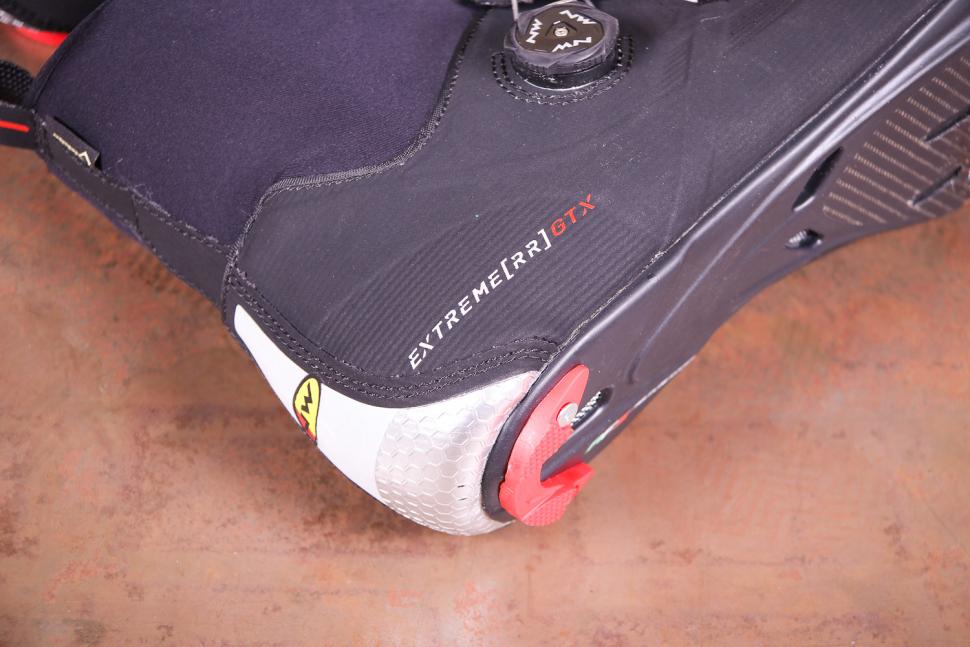
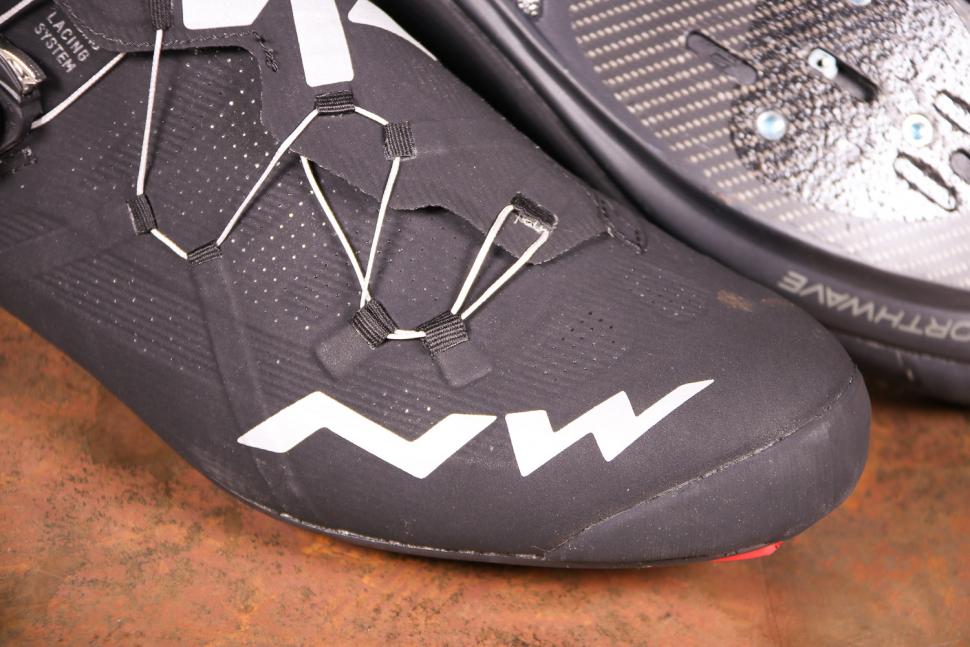

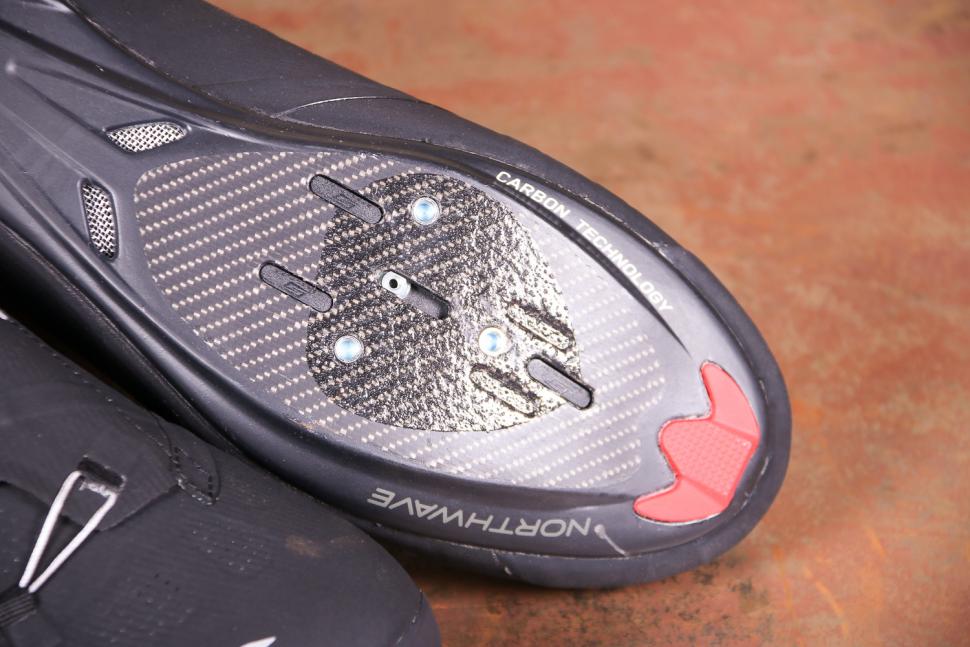
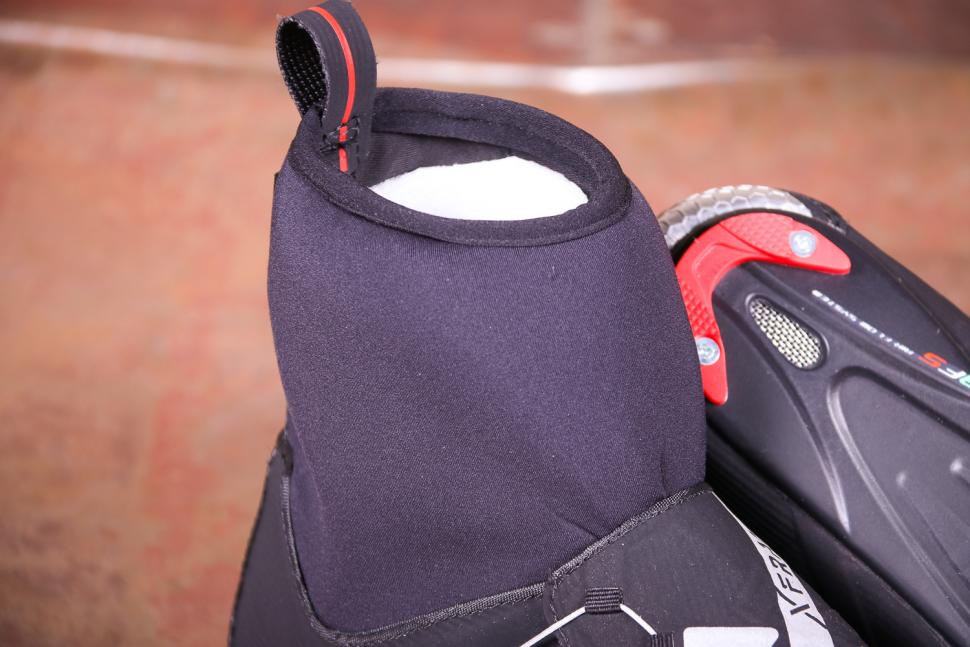
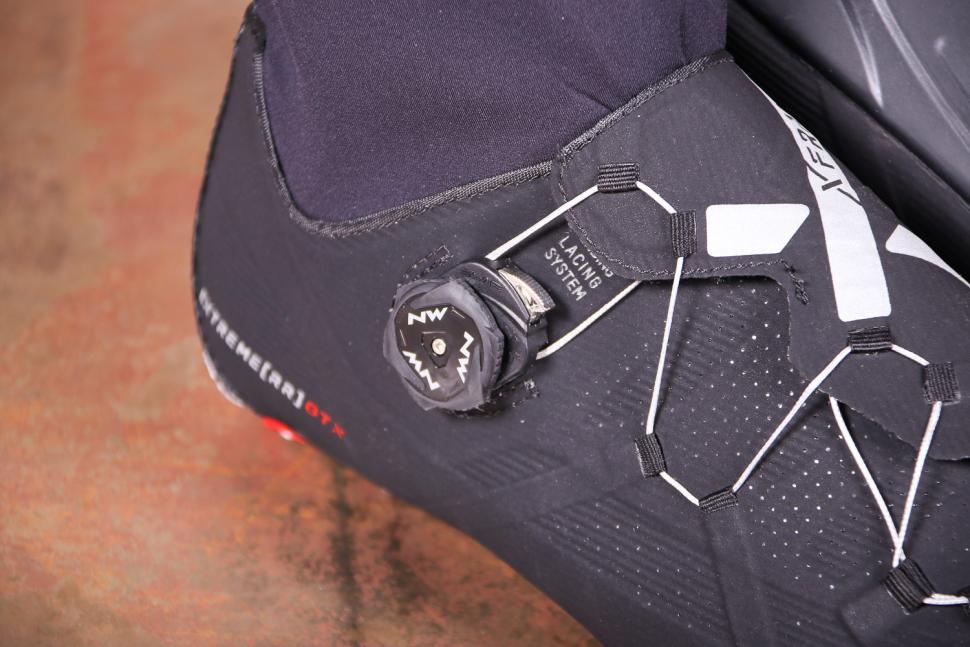
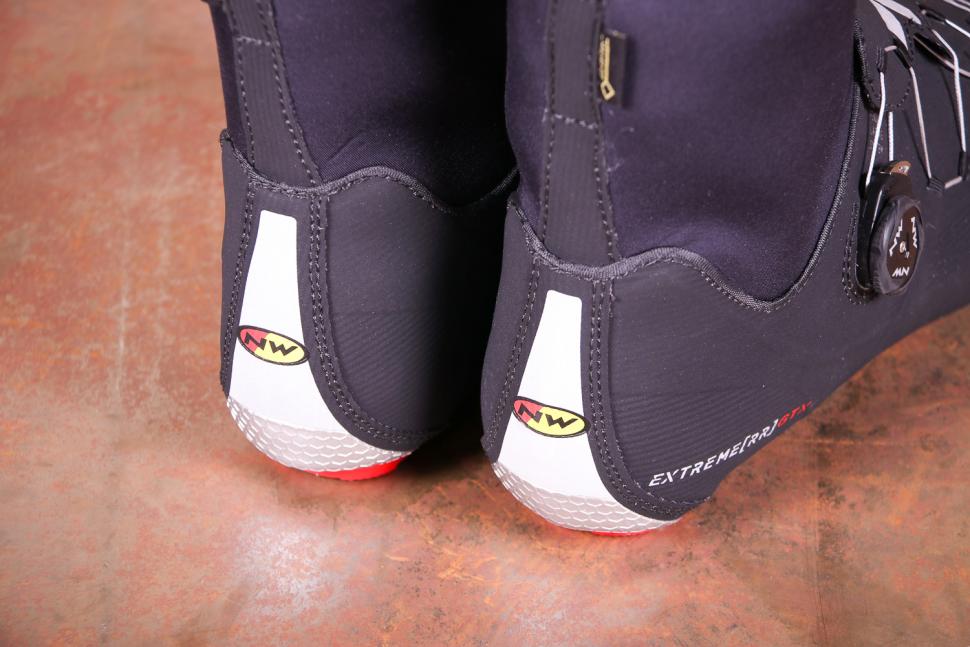
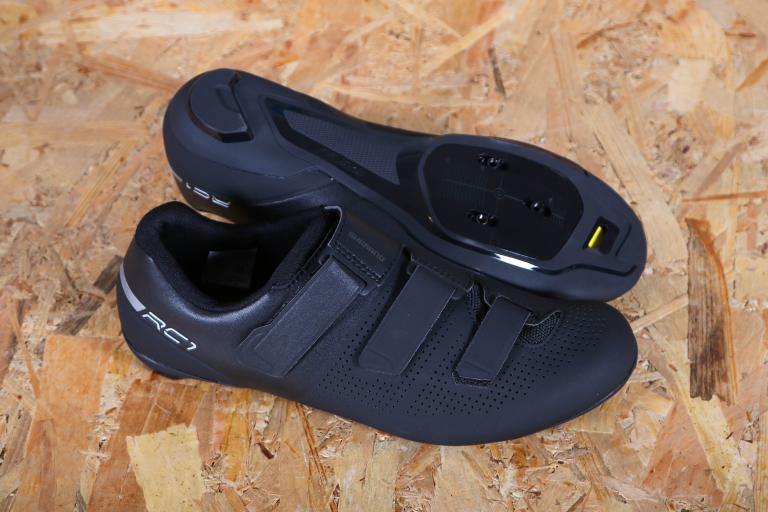
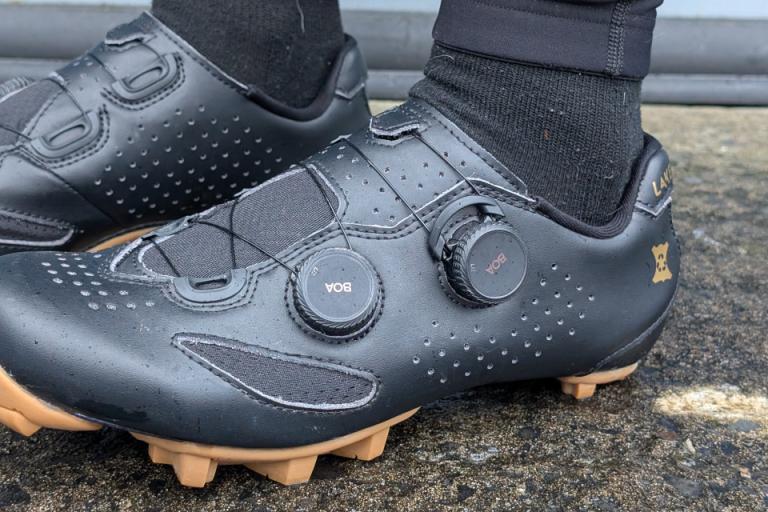
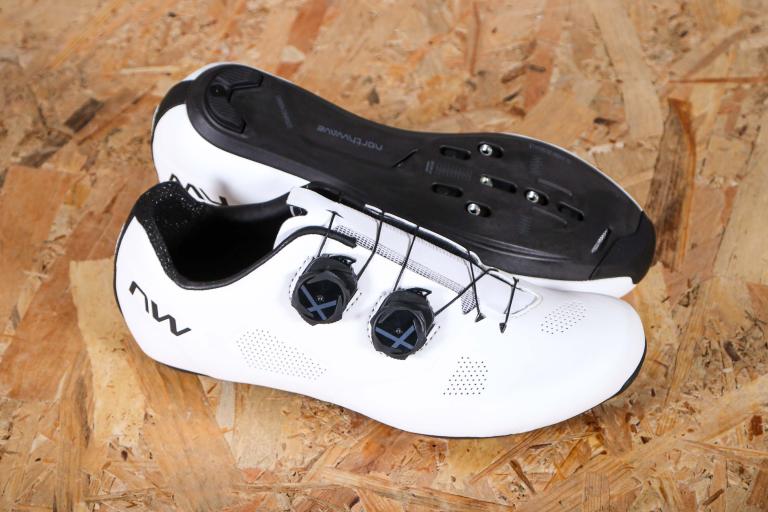
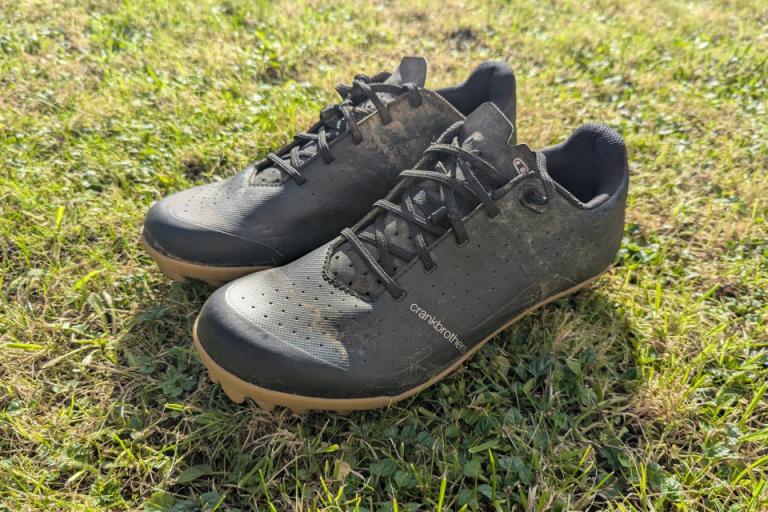
Add new comment
8 comments
A simple tip: finish your bib tights over the collar. Water will not get in that way.
I've got an older model of these boots and they're the best Winter riding boot/shoe I've ever used. I agree with another comment that the vents are a design-flaw that lead to water ingress very quickly, I used SuGru to block mine up and it transformed the performance of the boot. When it's very cold/wet I stretch a pair of lightweight neoprene overshoes over them, but usually the boot on its own is perfect.
i had a pair of NW with these vents ... first area of the socks that got wet ... under
the toes ... !!!
Some 5 minute epoxy soon fixed that issue. The arctic commuter fluro ones
are still going strong
I have the first generation of gore-tex NW winter boots and they are still going strong. I rode in torrential rain at the weekend with neoprene overboots and managed to get wet inside - which, of course, the gore-tex doesn't let out. I love NW shoes generally as I have a wide foot and they're light, comfortable and available in bright colours. Mine are dried out with a ski-boot drier - it's the only way to do it quickly - and yes - I was surprised to see the vents in the sole on these: perhaps they just stuck an existing summer sole onto them?
I have the same boots. Agree with all the positives in the review and I wouldn’t change them, but a few real world niggles for me.
Yes, I think the sole is pretty soft compared to my summer Sidi shoes, 10/15 is probably right. More comfortable for less strenuous winter riding if I’m honest. I don’t understand the need for vents in the sole for “breathability”, more likely to let in water, or accumulate hard to clean mud after riding on the winter trails. Biggest issue so far is the fiddly not so quick release, especially with frozen fingers... maybe I just need to buy better gloves!
I love NW and they are my current commute/Utility shoes and have been for quite a few years, rugged, comfortable and decent in all but the wettest of conditions, so, I don't get how a £240 pair of 'extreme' shoes seemingly aren't really up to extreme conditions.
I really can't beleive that a in a "heavy shower" that a pair of winter bibs will soak up enough water for this to make its way down and completely soak (as in totally wet through) your socks and shoes, sorry but that doesn't sound like a credible explanation, more likely the shoes aren't as great as being made out. You also missed a trick with stuffing with newspaper to help get some of the moisture out, it works just the same with modern tech footwear as it did with old skool stuff.
I've ridden in full on downpours with the the NW shoes I have with neoprene overcoat and pair of proper winter socks and not had the issues mentioned here. I've also done similar with full carbon soled shoes with 2 pair of socks and neoprene and again not experienced the "soaked" issue.
So, what gives, either your bibs are like seersucker and the narrowness at the ankles isn't any deterant to water or the shoes allow water to ingress somewhere else?
Northwave rate them a 10 for stiffness on a scale that reaches 15 - I didn't notice any flex at all, but bear in mind I wasn't heaving up 20% plus hills at max effort like I would in the summer. Ceratinly nothing noticeable in all the time I wore them.
How stiff is the sole on these as the old ones flexed like a wet noodle! Admittedly, this was when compared to my Bontrager XXX's but still very flexy.